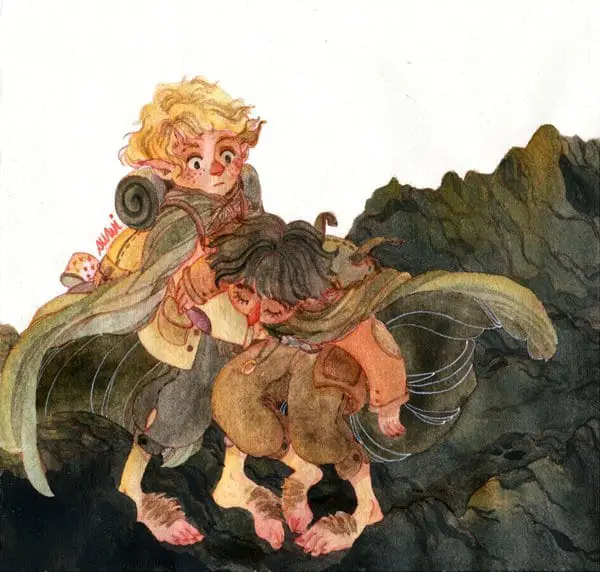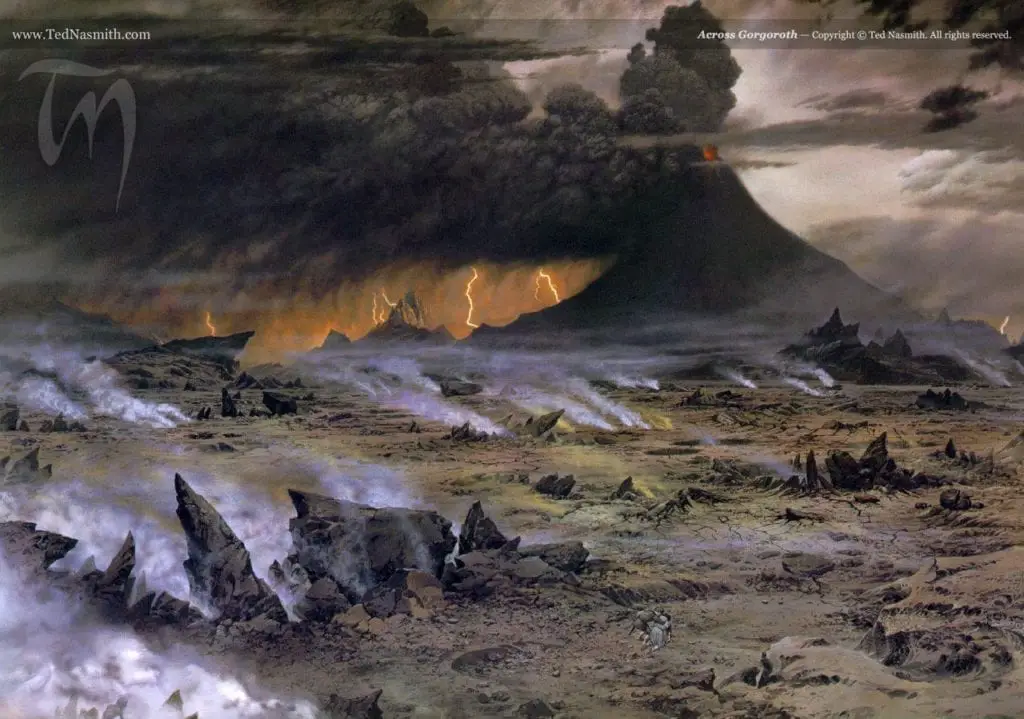I was intrigued going into Book VI at how this last leg of The Lord of the Rings was going to stack up in reality versus memory. While I’d always held Book VI to be my favorite, I’ve gotten the impression that that’s not a terribly common opinion. Kate Nepveu over at Tor, for example, associates it largely with an endless slog of long, grim walking. And that is… not wrong! “The Land of Shadow” covers twenty pages in my edition. Most of it consists of a long Despair Walk over Evil Lands. The land is sharp and ugly. There’s not enough food or water. Frodo’s hope meter has dried up entirely, and he powers himself forward solely on a blunt, practical reserve of duty. He assumes he’s going to die. It’s just a matter of giving it a go until then.
It says a lot about the tone of the chapter that within the first page Frodo and Sam dangle off the parapet of the Morgai road and then drop blindly into blackness, not knowing how far they are going to fall. They do this quickly and undramatically. What else could they do? It’s a brutal mirror image of the slow, pained descent through Emyl Muil, so many chapters ago. There, the hobbits nervously creeped over edges, armed with rope and light and rest. Things seemed bad then, ominous and pocked with danger. Here, they simply fall off a bridge into darkness. They make it: they have the luck (“luck”) to fall only twelve feet into a thorn bush. But there’s every chance in the world that they wouldn’t.
And that desperation characterizes the rest of the chapter. Frodo, when he speaks, does so in distracted, short sentences. “Look here, Sam dear lad,” he says at one point. “I am tired, weary, I haven’t a hope left. But I have to go on trying to get to the Mountain, as long as I can move.” And Tolkien remains pitiless towards his characters. For every instance that he gives them a trickle of bitter oil-water or allows for a “dreary canopy dim light [to leak] into Mordor like pale morning through the grimed window of a prison,” he also floods the path of Mount Doom with tightly-packed camps. Or he makes Frodo and Sam, after a twelve-mile walk (on hobbit legs!), endure a brutal forced run.
It’s no wonder, throughout this chapter, that Frodo so consistently abnegates himself. He rarely seems to think or feel, simply focusing his energy on the mechanical completion of his task. His personality seems largely blunted out. He cares about their obstacles only abstractly, repeating how unsurprised he is that things are going poorly. And in a particularly frightening moment, he reveals that not only his sense of self but his own past seems to be being stripped away. “This blind dark seems to be getting into my heart. As I lay in prison, Sam, I tried to remember the Brandywine, and Woody End, and The Water running through the mill at Hobbiton. But I can’t see them now.”

Light and High Beauty in Mordor
It’s disheartening how this sense of loss pervades even the chapter’s moments of relative hope. Sam’s wish for light is granted with an impressive speediness.
Away to their left, southward, against a sky that was turning grey, the peaks and high ridges of the great range began to appear dark and black, visible shapes. Light was growing behind them. Slowly it crept towards the North. There was battle far above in the high spaces of the air. The billowing clouds of Mordor were being driven back, their edges tattering as a wind out of the living world came up and swept the fumes and smokes towards the dark land of their home. Under the lifting skirts of the dreary canopy dim light leaked into Mordor like pale morning through the grimed window of a prison… It was the morning of the fifteenth of March, and over the vale of Anduin the Sun was rising above the eastern shadow and the southwest wind was blowing. Théoden lay dying on the Pelennor Fields.
It’d have been easy to make this an obviously triumphant moment. Something akin to the shaft of light illuminating the king’s head at the Crossroads. A new wind blows across the Pelennor, Éomer gets his eucatastrophe, and Aragorn turns the tide of battle. It seems things will metaphorically play out above Frodo and Sam, in that “battle far above in the high spaces of the air.” But there is so much distance. The light that comes is weak and grimy. Even when Tolkien steps in to tell us it’s the fifteenth of March, he chooses the grimmest depiction of what’s happening: Théoden lay dying on the Pelennor Fields. It’s an objective moment of hope, but in the moment it feels… largely useless. Mordor filters the light and the story into its grimmest iteration, like a depressed brain stuck in thought patterns that silence the good and augment the distressing.
It’s even, as per usual in Tolkien, reflected in the landscape. Mordor, Tolkien notes, “was a dying land, but it was not yet dead.” There seems to be some hope in this, especially since it comes on the tail of Frodo and Sam finding a trickle of unpleasant-but-potable water. It could be a moment of resistance, of the land itself fighting back against what Sauron has done to it (in a light parallel to Saruman). But instead, as we get deeper into the landscape, we find that all that has survived is violence.
Coarse grey grass-tussocks fought with the stones, and withered mosses crawled on them; and everywhere great writhing, tangled brambles sprawled. Some had long stabbing thorns, some hooked barbs that rent like knives.
Beyond that, the orcs and midges in the land have all be marked, branded by a Red Eye. And by the time Frodo and Sam reach the Morannon it is utterly desolate, bereft of any life at all. Over the course of the chapter, what started as apparent resistance is revealed to only be an allowance at best, and an articulation of Mordor itself at worst.
In both cases, moments of potential hope get kneecapped before they can really take hold. There is one moment, though, that seems like it manages to transcend this: when Sam sees a star.
There, peeping among the cloud-wrack above a dark tor high up in the mountains, Sam saw a white star twinkle for a while. The beauty of it smote his heart, as he looked up out of the forsaken land, and hope returned to him. For like a shaft, clear and cold, the thought pierced him that in the end the Shadow was only a small and passing thing: there was light and high beauty for ever beyond its reach. His song in the Tower had been defiance rather than hope; for then he was thinking of himself. Now, for the moment, his own fate, and even his master’s ceased to trouble him.
This passage was deeply meaningful for Little Katie. I remember re-reading it solemnly the way some people probably re-read the Bible. I was very attracted to the idea that beauty or hope could be a piercing, physical sensation. It always made me feel both hopeful and sad. That’s still there, but I am intrigued by the last two lines, which I hadn’t particularly remembered. The distinction provided here between defiance and hope is a fascinating one to me: the position of the self. Where Frodo’s despair seems to be manifesting in the loss of his own self, Sam seems to find hope in the same thing: in their very transience of their roles in the grand scheme of the story in which they partake. It’s a nice, complex moment, especially given how central individual choice is to Tolkien’s moral cosmos.

Final Points
- We get our seeding for the return of Gollum next chapter. I hadn’t recalled that Frodo inadvertently saved Gollum’s life here. His mail shirt, discarded on the first day of their walk, was picked up by Gollum and saved him from being killed by an orcish arrow in the back. I think I’m going to wait for our big conclusion next chapter to comment on that. But one of Frodo’s few moments of active choice in this chapter—to discard his mail shirt and sword, under the assumption that he’s done striking blows—saves the being that will ultimately save the mission.
- In a chapter that is decidedly Not Funny, I got a big laugh out of Sam saying “Let me drink first, Mr. Frodo” upon finding a trickle of water. Frodo, vaguely put off about it: “Alright, but there’s room enough for two.”
- It seems a reasonable reading to say that the star Sam sees is Earendil, though Tolkien doesn’t explicitly state it. (Kate Nepveu in the article linked above says Tolkien reveals it in the Appendices, but I haven’t checked). It works either way, both readings adding different kinds of complexity to the story.
- I have been delighted to find out how gossipy Mordor is and how ineffective its propaganda machine is. The orcs on Sam and Frodo’s trail note they don’t even know what they’re hunting for. “First they saw it’s a great Elf in bright armor, then it’s a sort of small dwarf-man, then it must be a pack of rebel Urukhai; or maybe it’s all the lot together.” The defeat of the Witch King of Angmar has also leaked, despite the party line that the War is Going Well. I like this both for the insight that some factions in Mordor are treasonously delighted at the demise of the “Shriekers,” and also because it makes me wonder if Tolkien cribbed some of this from the notorious role of propaganda in World War I.
- Prose Prize: “Away to their left, southward, against a sky that was turning grey, the peaks and high ridges of the great range began to appear dark and black, visible shapes. Light was growing behind them. Slowly it crept towards the North. There was battle far above in the high spaces of the air. The billowing clouds of Mordor were being driven back, their edges tattering as a wind out of the living world came up and swept the fumes and smokes towards the dark land of their home. Under the lifting skirts of the dreary canopy dim light leaked into Mordor like pale morning through the grimed window of a prison… It was the morning of the fifteenth of March, and over the vale of Anduin the Sun was rising above the eastern shadow and the southwest wind was blowing. Théoden lay dying on the Pelennor Fields.”
- Contemporary to this Chapter: As you can see right above, it’s Battle of Pelennor Field Day! As far as I can tell this chapter covers March 15-19, reaching the early parts of our other heroes’ march to Morannon. Also interesting, though, is the fact that Sam thinks on Lórien and Galadriel as they were being hit by the second assault of Mordor forces. “If only the Lady could see us or hear us, I’d say to her: ‘Your Ladyship, all we want is light and water: just clean water and plain daylight, better than any jewels, begging your pardon.’ But it’s a long way to Lórien.” Sam sighed and waved his hand towards the heights of the Ephel Dúath, now only to be guessed as a deeper blackness against the black sky.”
- In two weeks: the end of all things! Meet you at Mount Doom.

